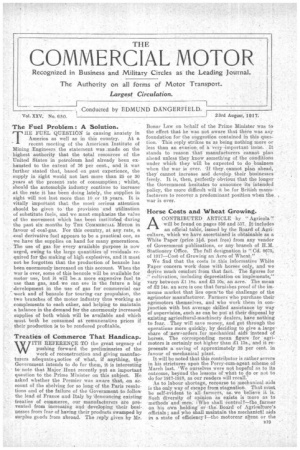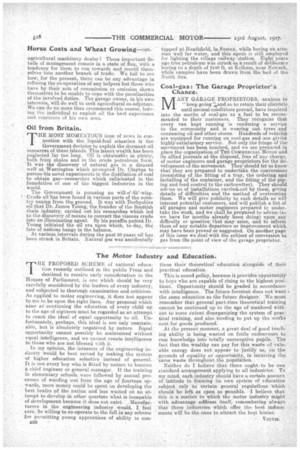The Fuel Problem : A Solution.
Page 1

Page 2

If you've noticed an error in this article please click here to report it so we can fix it.
THE FUEL 'QUESTION is causing anxiety in America as well as in this country. At a recent meeting of the American Institute of Mining Engineers the statement was ,made on the highest authority that the total resources of the United States in petroleum bad already been exhausted to the extent of 36 per cent., and it was further stated that, based on past experience, the supply in sight would not last more than 25 or 30 years at the present 'rate of consumption ; whilst, should the automobile industry continue to increase' at the rate it has been doing lately, the supplies in sight will not last more than 10 or 15 years. It is vitally important that the most serious attention • should be given to • the provision and utilization of substitute fuels, and we must emphasize the value of the movement 'which has been instituted ,during the past six months by THE COMMERCIAL Muroa in favour of coal-gas. For this country, at any, rate, a coal derivative fuel appears to be a practical one, as we have the supplies on hand for many generations. The use of gas for every available purpose is now urged, owing to the large quantities of residuals required for the making of high explosives, and it must not be forgotten that the production. of benzoic has been enormously increased on this account. When the war is over, some of this benzole will be available for motor • use; but it will be a more expensive fuel to _ use than gas, and we can see in the future a big development in the use of gas for commercial car . work and of benzole for touring car propulsion, the two branches of the motor industry thus working as complements to each other, and helping to maintain a balance in the demand for the enormously increased supplies of both which will be available and which must both be consumed at remunerative prices if their production is to be rendered profitable.
Treaties of Commerce That Handicap.
ITFI REFERENCE TO the great urgency of pushing forward the preliminaries of the work of reconstruction and giving manufacturers adequate$notice of what, if anything, the Government intends to clo for them, it is interesting to note that Major Hunt recently put an important question to the Prime Minister on this subject. He asked whether the Premier was aware that, on account of the shelving for so long of the Paris resolutions and of the failure of the Government to follow the lead of France and Italy by denouncing existing • treaties of commerce, our manufacturers are •prevented from increasing ariddeveloping their •businesses from fear of ha.ving their products swamped by surplus goods from abroad. The reply given by Mr. Bortar Law on behalf of the Prime Minister was to the effect that he was not aware that there was any foundation for the suggestion contained in this clues.: tion. This reply strikes us as .being nothing more or less than an evasion:. of a Very ,-important issue. It stands to reason . that manufacturers cannot plan ahead unless they know something of. the conditions. under which they will be expected to do ..business when the war is over. 'If they, cannot plan ahead, they' cannot increase and develdp their businesses freely. It is, then, perfectly obvious that the longer • the Government hesitates to announce its intended policy, the more difficult will it be for British manufacturers to-recover .a predominant position when the. war war is over.
-Horse Costs and .Wheat Growing.
CONTRIBUTED ARTICLE by "Agricola" will be found on pages 536 and 537. It includes an oicial table, issued by the Board of Agri culture, which we have ascertained is obtainable as a White Paper (price lid. post free) from any vendor of Government publications, or any branch of H.M. Stationery Office. The full designation is " Cd. 8675, of 1l7—Cost of Growing an Acre of Wheat."
We find that the costs ha _this infOrmative White Paper concern work done with horses only, and we dgrive much comfort from that fact. The figures for cultivation, including depreciation on implements," vary between £1 18s. and £3 10s. an acre. The mean of .E2 14s. an acre is one that furnishes proof of the immense market that lies open'to the challenge of the agrimotor manufacturer. Fartherwho purchase their agrimotors themselves, and who work them in conjunction with but average skilled assistance by way of supervisiOn, such as can be put-at their disposal by existing agricultural-machinery dealers, have nothing to fear. They will save money, and get through the operations more quickly, by deciding to give a large share of newiorders . for mechanical aids instead of horses. The cOrresponding mean figure for • agrimotors is certainly not higher than ,E1 13s., and it represents a. saving of approximately 33 per cent. in favour of mechanical plant.
It will be noted that this contributor is rather severe in his strietures upon the Perry-cum-agent scheme of March last. 'We ourselves were not hopeful as to its outcome, beyond the lessons of what to do or not to, do for 1917-1918, as our readers will recall.'
As to labotir shortage, recourse to mechanical-aids is the only way of escape from stagnation. That must be self-eVident to all farmers, as, we believe it is Such diversity of opinion as exists is more as to methods and men: Who shall control f—the farmer On his on hofding-'or -the, Board of Agriculture's officials ; and who shall maintain the raechanicAl aids in a state of efficiency 7—the motorcar atent or the vl 0 agricultural machinery dealer ? These important aetails of management remain in a state of flux, with a tendency for them to run towards and Mould themselves into another branch of trade. We fail to ice how, for the present, there can be any advantage in refusing the co-operation of any helpers but those who have by their acts of commission or omission Shown themselves to be unable to cope with the peculiarities of the involved duties. Thegarage owner, in his own interests, will do well to seek agricultural co-adjutors. We can do no more than recommend this course, !calving the individual to exploit all the best experience and resources of his own area.
Oil from Britain.
T„ HE MOST MOMENTOUS item of news in connection with the .liquid-fuel situation is the Government decision to exploit the dormant oil resources of these islands. This latent wealth has been neglected far too' long. Oil is obtainable in plenty, both from shale a and in the crude petroleum form. It waS the' discovery of natural gas in a disused well at Warrington which prompted Dr. Clayton to pursue his novel experiments in the distillation of coal to obtain gas—researches which culminated in the foundation of one of the biggest industries in the • world.
The Gavernment is pursuing no will-o'-th'-wisp. 9 Crude oil has been found in various parts of the country oozing from the ground. It was with Derbyshire oil that Dr. James Young, the founder of the Scottish shale industry, carried out his researches which led to the discovery of means to convert the viscous crude into an illuminating agent. By his paraffin patent Dr. Young initiated the oil era upon which, to-day, the fate of nations hangs in the balance. ' At various intervals during the past 50 years oil has been struck in Britain. Natural gas was accidentally tapped at Heathfield, in Sussex, while boring an artesian well for water, and this agent is still employed for lighting the village railway station. , Eight years ago true. petroleum was struck as a result of deliberate boring to a depth of 2440 ft. at Kelham, near Newark, while samples -have-been drawn from the .bed of the North Sea.
Coal-gas: The Garage Proprietor's Chance.
ANY GARAGE PROPRIETORS, anxious to ” keep going and so to retain their clientele. until normal conditions prevail, have inquired into the merits of coal-gas as a fuel to be recommended to their customers. They recognize that every van kept running is rendering a service to the community and is . wearing out tyres and consuming oil and other stores. Hundreds of vehicles are equipped for running on coal-gas and are giving . highly-satisfactory service. But only the fringe of the movement has been touched, and we are prepared to place the organization of THE COMMBRCIAL Motoa and its allied journals at the disposal, free of any charge, of motor engineers and garage proprietors for the development of the movement. They should let us know that they are prepared to undertakb the conversions (consisting of the fitting of a tray, the ordering and installing of the container, and the fitting of the piping and feed control to the carburetter). They should advise us of installations carriedsout by them, giving details of difficulties and the method of overcoming them. 'We will give publicity to, such details as will interest potential customers, and will publish a list of all garages and motor engineers prepared to undertake the work, and we shall be prepared to advise (as we have for months already been doing) upon any difficulty or question -that may arise, and to inform them of any notable departure or improvement which may have been proved or suggested. On another page of this issue we deal with the subject of conversion to gas from the point of view of the garage proprietor.






















